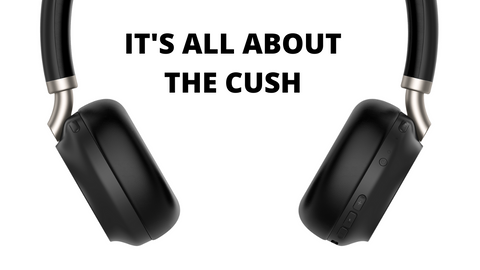If you’re responsible for supervising a staff of Agents in a Call Center, or are the Manager of one, then headsets aren’t foreign to you. For the vast majority of Contact Centers, headsets are a vital component of those things that help to make things run.
And whether you’re looking for headsets for a new center, or are replacing current ones, it takes time to wade through all the available options available today. You can choose from a number of brands such as:
- Poly, formerly known as Plantronics, now under the HP name
- Jabra
- Sennheiser, now operating under the name of EPOS
- Discover Headsets
- Yealink
No matter which make or model you might choose, there are five things you’ll want to keep in mind as you evaluate the options that will lead you to your final headset decision.
In this blog I’ll share with you the five things that I feel are most important when evaluating, and considering new headsets for your Call Center. And the truth is, if you ignore any of these, you can easily find yourself with a lot of problems. So with that in mind, here are the five things you need to consider when looking for new headsets for your Call Center.
1. Comfort

By design, this is number one on my list. Imagine your Agents are using the great sounding headsets you purchased for them, but those same headsets are so uncomfortable that you’re treated to a chorus of complaints on the daily? I doubt that’s how you want most days to go.
Comfort is a high priority especially when it comes to headsets that will be worn all day. Discomfort can show up in different ways;
- Pain from a headband being too tight causing pressure, soreness and even headaches. Some can even experience migraine headaches from this.
- Frustration from a headband that won’t stay on your head. This can cause the Agent to concentrate on the headband as much as the quality of the call.
- Pain from ear cushions that don’t provide enough padding, or from ear cushions that are too small, too large, or are rigid rather than soft.
- Discomfort can show up in the form of earpieces that make the outer portion of your ear sore. This relates to earpiece headsets that have an ear loop that wraps around the ear. You can even develop a sore ear canal if it’s the kind of earpiece that has earbuds, especially if the piece that goes into the ear is too tight, or too loose which could cause you to continuously reinsert it into your ear.
The point I’m wanting to make here is that comfort needs to be considered or you could find yourself hearing a lot of complaints from your staff. I’ll admit that you can’t find one headset that’s universally comfortable for everyone, but time isn’t wasted on trying to narrow down your search to those models that offer more in the way of comfort.
Agent comfort involves many things. Place them on a bad chair, and ask them to sit on it for 8-10 hours each day, and you’ll probably hear complaints, or even worse, begin seeing absences from physical issues brought on by that cheap chair. So whether it’s chairs, ergonomic keyboards and mic, stand up desks, or headsets, comfort is something that shouldn’t be overlooked when making buying decisions.
2. Put quality into sound quality

You can have a very comfortable headset, but if it sounds bad, it’s of no real value to you. So yes, the headsets you buy need to be comfortable, but they also need to provide you with professional sound quality. Your Agents deserve it, and so do your callers.
When evaluating headsets, and your focus is on sound quality, what does that include? Here are the things that I think need to be taken into consideration.
- Microphone sound quality. This is the heart and soul of it all, because if your Agents sound bad to your callers, you may hear complaints, and your Agents might find that they have to repeat themselves a lot. These things can be frustrating for your Agents, and your callers.
- Ear speaker sound quality. You don’t want your Agents struggling to hear, so having headsets that have decent ear speaker sound quality is also an important thing to keep in mind. When you dig into the details of ear speakers, you’ll find that they vary quite a bit including the size of speakers which directly contributes to the sound you get, and with some headsets, acoustic shock protection. This is a headset feature that helps protect you from sudden, unexpected sound bursts. If you’d like to know more about acoustic shock, here’s an article from audiologyonline, by Janice C. Milhinch titled “Acoustic Shock Injury: Real or Imaginary” My point in raising ear speakers is you want your Agents to hear your callers loud and clear. Having good quality ear speakers will make it easier for them to hear easily, without struggle, and without the need for callers to repeat themselves.
- Distracting sound from your background. Ambient room noises can distract Agents, and cause them to lose their focus and concentration. This can reduce productivity, and can lead to a lot of frustration. Call Center Managers can employ different things to help make the room noise less distracting, such as introducing white noise to help counter it. Options for white noise generators, or sound masking are plentiful. If you Google search best sound masking for Call Center, you’ll be presented with several pages of results.You can also closely monitor the noise level in the Call Center, and then take steps to lower it when noise reaches certain levels. One tool that’s available to Call Center Managers is available from Jabra called the noise guide. This is a device that monitors noise levels, and displays a bright ear shaped LED that changes color from green, to amber and then to red as the decibels rise. As a Manager sees this color change, they can take corrective action to help reduce the noise.
Ear Cushions

Another thing to consider in the effort to handle noise is ear cushion size, and a relatively new feature appearing on headsets called Active Noise Cancellation, or ANC for short. First, having ear cushions that fully surround the ear helps to provide a sound barrier. When sound isn’t allowed in, the Agent isn’t distracted and can therefore remain focused and more productive. Ear cushions having this design, like the Discover D722U, filters out unwanted noise passively. That is, there’s no technology involved, just material between the noise, and the ear to help prevent noise intrusion. You will also see ear cushions made from different material like foam, and leatherette. Foam is pourous and tends to allowmore noise in. Leatherette is a more dense material which helps to shield you from noise better, so if noise reduction is your goal, then choosing a headset with leatherette ear cushions over foam is a good idea.
ANC

The other noise reducing feature is Active Noise Cancellation (ANC). This is an electronic feature that sends out anti-noise to help arrest the sound so you don’t hear it. This is a headset feature that we’re beginning to see more often in new models. Some provide ANC on/off, while others, like the Orosound Tilde Pro, give you several levels of ANC so you can choose how much noise you want removed. Either way, sound gets removed, and your Agents have a much quieter work experience which makes them happier, and more productive.
The takeaway in this section is to suggest that giving some time and attention to headset ear speakers, ear cushions, hearing protection, and noise removal all contribute to giving your Agents a better, more comfortable listening experience. And as a Manager, anything you can do to help your Agents be happier while at work isn’t wasted energy as far as I’m concerned.
3. Headset connectivity - Your needs today and tomorrow

This is a subject that is seldom given a lot of thought. Most will give thought to current needs, and not carefully consider needs that may arise in the future.
An example of this is buying headsets for IP phones that are currently in use, but not taking into account the organization’s plan to migrate to softphones in the near future. If those needs aren’t identified and taken into consideration, the headsets you buy today will not be compatible with the softphones you purchase later on. That will cause you to abandon those recently acquired headsets, and have you back in the market for new, compatible ones. That’s a waste of time, and also a waste of money, both being valuable resources to the company.
Headsets today have the ability to connect to

And though you might not need additional connectivity today, it’s reasonable to take the needs you foresee into account when making your headset decisions. That underscores the importance of having a good line of communication with your IT Department, or those making your technology decisions. When you’re more informed, you’re able to make better decisions for you, your staff, and your company.
4. The value of headset reliability

We all like our things to be there when we need them. Who doesn’t like their car to be reliable? And on that hot summer day, I’m pretty sure we all appreciate the reliability of our air conditioning. Even with our partners, we want them to be reliable too. The need for reliability extends into the Call Center too when it comes to the headset that’s being counted on for daily conversations.
Just imagine the downstream effects of having a headset that’s unreliable. Does that unreliable headset help to deliver good customer service? Does it make the Call Center Agent happy? Does it help the Agent to be as productive as they can be? We all know the answer to questions like these, because when you work in a Call Center, you need your headset to perform reliably.
So how do you know if that new headset you’re considering is reliable? The truth is, you don’t. But there are some things that you can do to give you some peace of mind before giving the go-ahead, or clicking on that buy button..
- Reputation of the company. This can refer to the company that manufactures the headset, and/or the company that sells it to you, and is responsible for standing behind it. Either way, it’s a very good idea to know the company you plan on contracting with. This can be accomplished through some online investigation, or even having some conversations with your peers who work in different departments, or different companies. Third party reviews are helpful, and if you consider those, it’s not a bad idea to utilize several different sources. This helps to give you perspectives from different sources which can help to prevent you from only seeing filtered results which of course don’t paint the true picture.
- Try before you buy. To me, this is always a good idea unless you’re reordering headsets known, or have them already in use. Otherwise, trying out a headset in your exact working climate can give you a lot of useful information such as comfort, sound quality, and if sampling long enough, a sense of reliability.
-
Warranty. There are a lot of differences in headset warranties like the length of the warranty, what’s covered and what’s not, and the ease of working with your headset vendor for warranty issues. Wired and wireless headsets may come with a warranty ranging in duration from one year, to as many as three. Longer warranties can be valuable if you end up with a headset that isn’t as reliable as you hoped for because you have the option for a no cost replacement. Though the exchange process can be inconvenient, you can at least get it replaced without paying more, and there’s value in that.
Unless you have first-hand experience, or know of another Department using the headset you’re considering, you’re always taking a risk. Online reviews can be helpful, but make sure that you’re reading reviews from a company that doesn’t filter reviews, or doesn’t compensate for them because both won’t give you clear, unbiased information.
This takes me to my fifth and final point on buying Call Center headsets, which is your vendor.
5. Your vendor - why it matters

When you’re in the market for new headsets for your Call Center, your “vendor” could be:
- An online store
- A headset company that you have personal contact with (phone, email, live chat, etc)
- The local big box store
- A non-headset company like an Ergonomics, computer or software company you work with.
Whichever you use, there’s huge value in selecting a good source to provide you with your headsets. Here are the things that I think are important:
- Expertise. Does the company have experience and technical knowledge of headsets? Do they demonstrate this during your interactions with them, or do you find that they need to “do some research, and get back to you?” Generally speaking, a company that knows headsets well is fairly easy to detect. Life is full of choices, and one of those choices is whether you choose to contract with a knowledgeable company, or not.
- Experience. How long has the company been in business, and during that time, have they focused on headsets, or are headsets part of a long list of products they offer? This speaks to the subject of specialization and generalization. If you want the best, most up-to-date information on the subject, you go to someone who specializes. In this case, that would be to a company who has a singular focus. Because when you choose that company, it will be a more informative experience.
- Reputation. Does the vendor have a good reputation? If you don’t know the answer, you should take some time and find out. Vendor relationships are just that, relationships, and you want it to be as good as possible. Check out the Better Business Bureau and see what rating they have, and if there have been any complaints registered against them. You can also read Google reviews to see what others are saying about the company. Another option is to look at Social Media to see if they have a presence there, and if so, you can likely get a sense of their professionalism and philosophies from their posts. Whichever method you choose, a little time spent up front, can really help to save you some real headaches downstream, because you don’t want vendor challenges added to all the other things you’re having to manage.
- Responsiveness. I feel pretty safe in saying that we all know the frustrations associated with bad communication. We call, or email and we get ghosted. Who likes that? Nobody that I know. When you have a need for support, you need a vendor that’s responsive. You want your call to be answered or returned promptly, just like with your emails. This goes back to doing some vendor research, because if customer reviews contain comments about bad communication, you probably want to keep vendor searching.
- Fair and reasonable pricing. I get that pricing matters, but if you want the best possible vendor experience, you might need to pay a little more than the cheapest price you can find online.
Waren Buffet was quoted as saying: "price is what you pay, value is what you get"
Benjamin Franklin was quoted as saying: "The bitterness of poor quality remains long after the sweetness of low price is forgotten"
Fair and reasonable pricing combined with a knowledgeable expert in the field, whose very responsive makes for a great long-term association. And if you’re looking for a quantity of headsets, make sure to ask about bulk pricing. Many vendors offer it, so it’s worth asking about. Lastly, if you have old headsets that are being replaced, it’s worth asking if the vendor offers trade-in credit. This can help to make your new headset pricing even more attractive. And lastly, if you feel that a low cost, monthly headset lease program would make acquiring new headsets easier, ask if they offer it. Most headset companies don’t but there are some that do, and you might be surprised to see how affordable they are on a short-term lease.
Contact us if you have any questions

So there you have it, my five keys to buying headsets for your Call Center. I hope you found this to be informative, and hopefully helpful. If you have any questions, or need some tailored recommendations, make sure to contact us here at Discover Headsets, and one of our highly trained Advisors will be happy to help. We're just a mouse click, or phone call away.
Contact Discover Headsets here.



